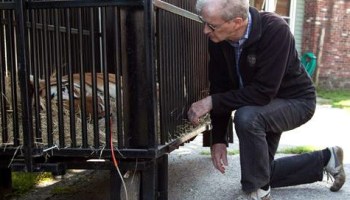
William Nimmo, founder of Tigers in America, a rescue network, with Caesar: ‘Tiger King is just sort of these swamp people with tigers. It doesn’t have a lot to do with making things better, or actually talking about the fate of the cats.’
By Duncan Strauss
It’s safe to say the noisy reaction detonated by Tiger King–the Netflix documentary series that explored the often-dark world of captive tigers, and those who keep them–reflected a confluence of folks being relegated for the first time to coronavirus-mandated lockdown, a truly captive audience hungry for binge-worthy programming–and the relentlessly salacious nature of the series.
The character at the center of this doc–I can’t really bring myself to call him the star–is Joseph Maldonado-Passage, but answers to the colorful sobriquet, “Joe Exotic.”
Tiger King‘s titular figure, Exotic is presented as a meth-using gay polygamist country singer, who, in running his Oklahoma private zoo, G.W. Exotic Animal Park, made it perfectly clear that the priority was always dollars over tigers. Animal exploitation is the name of his game. (Incidentally, turns out that’s not him singing. Shocker.)
While the docu-series isn’t stingy about offering airtime to other distinctive personalities orbiting around Exotic–including Bhagavan “Doc” Antle, the pony-tailed polyamorous owner of a South Carolina facility, The Institute for Greatly Endangered and Rare Species (T.I.G.E.R.S.), and other major players in the tiger trade–his co-star of sorts is Carole Baskin.
Early in her life, Baskin engaged in the enterprises (breeding big cats, buying and selling them, etc.) that color Exotic, Antle and others as shady operators. Or should have colored them that way; we’ll circle back to some of the series’ missed opportunities and muddled messages in a moment.

10 Things Netflix Didn’t Show You in Tiger King
in a powerful tale of redemption, Baskin transformed herself from breeder-broker to caretaker-advocate: She’s CEO of Big Cat Rescue, a highly respected sanctuary in Tampa that houses more than 50 tigers, lions and other big cats that were abused, abandoned, orphaned, rescued from circuses, roadside zoos or private operations like Exotic’s. Over the years, Baskin has actively sought to expose–and when possible, shut down–tiger breeding and cub petting businesses.
So, Baskin and Exotic are longtime rivals, and the way Tiger King’s storytelling is framed, they appear to be equally reprehensible rivals-if anything, the series leans toward glorifying Exotic, even though we watch him routinely exploit (and do away with) tigers…and he hires someone to kill Carole Baskin. (He was sentenced to 22 years in federal prison.)
Long before Tiger King hit the screen, I was pretty conversant with this world, having spoken, over the years, with a number of players and experts on Talking Animals. For example, I’ve interviewed Baskin five times, dating back to 2006 and as recently as January of this year. There’s brief footage of one of those Baskin interviews in the first episode of this series–I had no idea beforehand that I’m in this thing.
Heck, that probably ranks near the bottom of the list of Strange Things About Tiger King. Indeed, once it started airing, countless folks weighed in on the series–often focused on Exotic and Baskin (particularly the mysterious disappearance of her previous husband, Don Lewis)–in a frenzy of social media posts, while pundits of all stripes churned out a long string of think pieces (and, in some instances, non-think pieces.)
Once this chatter–the relentless din of Tiger King noise–had subsided, I wanted to consult a true expert for a serious-minded, unemotional assessment of the Netflix series. I turned to William Nimmo, founder of Tigers in America, a rescue network that has relocated more than 250 tigers from private owners, roadside zoos, and other nefarious operations, placing the cats in top-tier sanctuaries.
A former Wall Street investment banker, Nimmo is arguably the nation’s leading authority on captive tigers. So, what did he think of Tiger King?
“Well, it was entertaining,” Nimmo said in an April 22 Talking Animals interview.
I wonder aloud if that sort of response might connect to the very problem with the Tiger King phenomenon: that no one else watching could match Nimmo’s expertise, so most aren’t discerning viewers, and it’s unlikely anyone could have anticipated the series’ soaring popularity–but that reflects the improbable intersection of everyone being in the initial days of COVID-19 lockdown, and the release of a sordid multi-part series that hordes of folks found gripping and absolutely irresistible.
So, against that backdrop, an initial question might be: What key information did Tiger King get right?
“It is an accurate presentation,” Nimmo said, “of the people that are in this business–I don’t want to call it the bad guy business, but that are in the breeding and distribution and exhibition business. Those are the people that we know, and typical of most of the people who do that.”

Breaking Down Netflix’s New Series, Tiger King
As for addressing what filmmakers Eric Goode and Rebecca Chaikin–and the series, overall–didn’t get right, that’s clearly a thornier question. “In terms of what they got wrong, a little bit of that is perspective and it’s what did Eric and Rebecca want to do? I think, and I don’t want to be inside their heads, but it seems that they wanted a reality show.
“They didn’t want a documentary about how brutal and abusive the business is-they wanted a show about controversy and about people. It wasn’t about the fate of the tigers. It was about the people engaged in this activity. A lot of people I know were thinking, ‘Oh, finally, we’re going to get the Blackfish for tigers.'”
To be sure, to hear Carole Baskin tell it, that’s exactly how Goode and Chaikin proposed the doc-series to her, when seeking her participation. Big Cat Rescue is regularly approached about getting involved with documentaries, other films, television series, and so on, and nearly as regularly, they decline.
Baskin and her husband, Howard Baskin, have each recounted that the filmmakers’ pitch was that Tiger King would be the captive-tiger equivalent of Blackfish, the groundbreaking documentary examining the world of captive orcas. Because they thought that was the sort of project they were cooperating with, the Baskins opened up Big Cat Rescue to Goode and Chaikin, giving them tremendous access to the sanctuary to film there over multiple visits.
The Baskins have gone on record saying that upon seeing the series, they felt betrayed. What people saw was a far cry from Blackfish. “Tiger King is just sort of these swamp people with tigers,” Nimmo said. “It doesn’t have a lot to do with making things better, or actually talking about the fate of the cats.”
Many of Nimmo’s concerns about the series involve missed opportunities to impart important, if difficult, information to the unknowing public–a key virtue of Blackfish–and, worse, that Tiger King sometimes sends the wrong message, and misrepresents some key information.
For example, while no one’s going to confuse Joe Exotic with a virtuous human, he is portrayed as something of a heroic figure (though many would argue anti-heroic), and a sizable contingent of viewers became enchanted by him, to the extent that he drew celebrity supporters, like Kim Kardashian and Kanye West, who reportedly lobbied Trump to reduce Exotic’s prison sentence.
People familiar with Exotic hold a different view. “Joe is sort of the most extreme example of what we’d call a breeder-dealer,” Nimmo said. “In the breeding system, there are tiers of tiger breeding, and Joe is the largest of all the tiger breeder-dealers. And by breeder-dealer, we mean he not only breeds himself and sells, but he has a nationwide distribution system.
“Same is true for Doc Antle. But I guess the headline for Joe is that he is the example of unregulated, no limit breeding. Right? You can breed as many tigers as you want, and he had over 200.”

In April of 2003, government officials executed a search warrant on a ‘pseudo-sanctuary’ operated under the name ‘Colton Tiger Rescue’ in Colton, California. During their search of the owner’s residence, they discovered 90 dead tiger carcasses, including 58 baby tigers dead in a freezer. Thirteen other cats were barely alive. The State of California seized control of Colton Tiger Rescue. Criminal charges were brought against the owner. Homes were found for the healthiest big cats; 39 tigers remained. The Performing Animal Welfare Society (PAWS) agreed to take the remaining tigers. After enormous volunteer support, rehabilitation and a massive fundraising effort to construct 10 acres of habitat at PAWS’ ARK 2000 captive wildlife sanctuary in San Andreas, California, 39 tigers were moved to their new home in what is still considered the largest tiger rescue in U.S. history. 39 Tigers, a documentary by William Nimmo, founder of Tigers in America, chronicles the rescue.
Beyond the misimpression created by the Netflix series, there’s an additionally troubling by-product of exalting Exotic: Many of those who responded to Tiger King on social media, in essays and elsewhere suggested an equivalency between Exotic, Doc Antle, others of that ilk and Carole Baskin. That struck many as a false equivalency. Isn’t it?
“Yeah, it is quite false,” he said, “and once you’re the editor, you can decide to manufacture controversy to the extent that you want to. That’s an editing decision on the part of the people who made the film. Carol is among the top 10 of people who care for [big] cats.”
We covered a number of other points, and as we neared the end of the interview, a thought popped into my head: Given Nimmo’s stature and expertise, I wondered if the filmmakers contacted him, seeking his involvement or perspective for the series.
“Yes, they did. Eric came up to me,” Nimmo said, explaining that Goode attended a conference where Nimmo gave a presentation, and approached him afterwards for an interview. He told Goode that he needed to hear more about the project, and its objective.
“The conversation got a little fuzzy. I mean, you can sort of tell that by the types of questions and then how frenetic somebody is, or how many questions they ask about the cats, and stuff like that.
“Not that the conversation didn’t go well. He was a nice guy. I just didn’t think the right message would get out. I respectfully declined.
Follow this link to the William Nimmo interview on this edition of Talking Animals:
 About the Author: Combining his passions for animals, radio, journalism, music and comedy, Duncan Strauss launched Talking Animals at KUCI in California in 2003. Since late 2005 the show has aired on Tampa’s WMNF. Producer-host Strauss lives in Jupiter Farms, FL, with his family, including four cats, two horses and one dog. He spends each day talking to those animals, and maintains they talk right back to him, a claim as yet unverified by credible sources.
About the Author: Combining his passions for animals, radio, journalism, music and comedy, Duncan Strauss launched Talking Animals at KUCI in California in 2003. Since late 2005 the show has aired on Tampa’s WMNF. Producer-host Strauss lives in Jupiter Farms, FL, with his family, including four cats, two horses and one dog. He spends each day talking to those animals, and maintains they talk right back to him, a claim as yet unverified by credible sources.


